- Home
- H. Rider Haggard
Stella Fregelius: A Tale of Three Destinies Page 17
Stella Fregelius: A Tale of Three Destinies Read online
Page 17
Shortly after this curious conversation, which was never renewed betweenthem, or, at least, but once, a new element entered into the drama, thenecessary semi-comic element without which everything would be so dull.This fresh factor was the infatuation, which possibly the reader mayhave foreseen, of the susceptible, impulsive little man, Stephen Layard,for Stella Fregelius, the lady whose singing he had admired, and whohad been a cause of war between him and his sister. Like many weak men,Stephen Layard was obstinate, also from boyhood up he had sufferedmuch at the hands of Eliza, who was not, in fact, quite so young asshe looked. Hence there arose in his breast a very natural desire forretaliation. Eliza had taken a violent dislike to Miss Fregelius, whomhe thought charming. This circumstance in their strained relations wasreason enough to induce Stephen to pay court to her, even if his naturalinclination had not made the adventure very congenial.
Therefore, on the first opportunity he called at the Abbey to ask afterthe rector, to be, as he had hoped, received by Stella. Finding hisvisit exceedingly agreeable, after a day or two he repeated it, andthis time was conducted to the old clergyman's bedroom, upon whom hiscivility made a good impression.
Now, as it happened, although he did not live in Monksland, Mr. Layardwas one of the largest property owners in the parish, a circumstancewhich he did not fail to impress upon the new rector. Being by natureand training a hard-working man who wished to do his best for his cureeven while he lay helpless, Mr. Fregelius welcomed the advances of thiswealthy young gentleman with enthusiasm, especially when he found thathe was no niggard. A piece of land was wanted for the cemetery. Mr.Layard offered to present an acre. Money was lacking to pay off a debtupon the reading-room. Mr. Layard headed the subscription list with ahandsome sum. And so forth.
Now the details of these various arrangements could not conveniently besettled without many interviews, and thus very soon it came about thatscarcely a day went by upon which Mr. Layard's dog-cart did not passthrough the Abbey gates. Generally he came in the morning and stopped tolunch; or he came in the afternoon and stopped to tea. In fact, or thusit seemed to Morris, he always stopped to something, so much so thatalthough not lacking in hospitality, at times Morris found his presencewearisome, for in truth the two men had nothing in common.
"He must have turned over a new leaf with a vengeance, for he neverwould give a sixpence to anything during old Tomley's time," remarkedMorris to Stella. "I suppose that he has taken a great fancy to yourfather, which is a good thing for the parish, as those Layards arericher than Croesus."
"Yes," answered Stella with a curious little smile.
But to herself she did not smile; for, if Morris found his visitor abore, to Stella he was nothing short of an infliction, increased ratherthan mitigated by numerous presents of hot-house fruit and flowersoffered to herself, and entailing, each of them, an expression of thanksverbal or written. At first she treated the thing as a joke, till itgrew evident that her admirer was as much in earnest as his nature wouldpermit. Thereon, foreseeing eventualities, she became alarmed.
Unless some means could be found to stop him it was now clear toStella that Mr. Layard meant to propose to her, and as she had not theslightest intention of accepting him this was an honour which she didnot seek. But she could find no sufficient means; hints, and even snubs,only seemed to add fuel to the fire, and of a perpetual game of hide andseek she grew weary.
So it came about that at last she shrugged her shoulders and left thingsto take their chance, finding some consolation for her discomfort inthe knowledge that Miss Layard, convinced that the rector's daughter wasluring her inexperienced brother into an evil matrimonial net, couldin no wise restrain her rage and indignation. So openly did this ladyexpress her views, indeed, that at length a report of them reached evenMorris's inattentive ears, whereon he was at first very angry and thenburst out laughing. That a man like Stephen Layard should hope to marrya woman like Stella Fregelius seemed to him so absurd as to be almostunnatural. Yet when he came to think it over quietly he was constrainedto admit to himself that the match would have many advantages for theyoung lady, whereof the first and foremost were that Stephen was veryrich, and although slangy and without education in its better sense, atheart by no means a bad little fellow. So Morris shrugged his shoulders,shut his eyes, continued to dispense luncheons and afternoon teas, andthough with an uneasy mind, like Stella herself, allowed things to taketheir chance.
All this while, however, his own friendship with Stella grew apace,enhanced as it was in no small degree by the fact that now her help inhis scientific operations had become most valuable. Indeed, it appearedthat he was destined to owe the final success of his instrument to theassistance of women who, at the beginning, at any rate, knew little ofits principles. Mary, it may be remembered, by some fortunate chance,made the suggestion as to the substance of the receiver, which turnedthe aerophone from a great idea into a practical reality. Now tocomplete the work it was Stella, not by accident, but after carefulstudy of its problem who gave the thought that led to the removal of theone remaining obstacle to its general and successful establishment.
To test this new development of the famous sound deflector and perfectits details, scores of experiments were needed, most of which he and shecarried out together. This was their plan. One of them established himor herself in the ruined building known as the Dead Church, while theother took up a position in the Abbey workshop. From these respectivepoints, a distance of about two miles, they tested the machines withresults that day by day grew better and clearer, till at length, underthese conditions they were almost perfect.
Strange was the experience and great the triumph when at last Morris,seated in the Abbey with his apparatus before him, unconnected with itstwin by any visible medium, was able without interruption for a wholemorning to converse with Stella established in the Dead Church.
"It is done," he cried in unusual exultation. "Now, if I die to-morrowit does not matter."
Instantly came the answer in Stella's voice.
"I am very happy. If I do nothing else I have helped a man to fame."
Then a hitch arose, the inevitable hitch; it was found that, in certainstates of the atmosphere, and sometimes at fixed hours of the day, thesounds coming from the receiver were almost inaudible. At other timesagain the motive force seemed to be so extraordinarily active that, thesound deflector notwithstanding, the instrument captured and transmitteda thousand noises which are not to be heard by the unobservant listener,or in some cases by any human ear.
Weird enough these noises were at times. Like great sighs they came,like the moan of the breeze brought from an infinite distance, likemutterings and groanings arisen from the very bowels of the earth. Thenthere were the splash or boom of the waves, the piping of the sea-wind,the cry of curlew, or black-backed gulls, all mingled in one great andtangled skein of sound that choked the voice of the speaker, and intheir aggregate, bewildered him who hearkened.
These, and others which need not be detailed, were problems that hadto be met, necessitating many more experiments. Thus it came about thatthrough most of the short hours of winter daylight Morris and Stellafound themselves at their respective positions, corresponding, or tryingto correspond, through the aerophones. If the weather was very bad,or very cold, Morris went to the dead Church, otherwise that post wasallotted to Stella, both because it was more convenient that Morrisshould stay in his laboratory, and by her own choice.
Two principal reasons caused her to prefer to pass as much of her timeas was possible in this desolate and unvisited spot. First, because Mr.Layard was less likely to find her when he called, and secondly, thatfor her it had a strange fascination. Indeed, she loved the place,clothed as it was with a thousand memories of those who had been humanlike herself, but now--were not. She would read the inscriptions uponthe chancel stones and study the coats-of-arms and names of thosedeparted, trying to give to each lost man and woman a shape andcharacter, till at length she knew all the monuments by appearance aswel
l as by the names inscribed upon them.
One of these dead, oddly enough, had been named Stella Ethel Smythe,daughter of Sir Thomas Smythe, whose family lived at the old hall nowin the possession of the Layards. This Stella had died at the age oftwenty-five in the year 1741, and her tombstone recorded that in mindshe was clean and sweet, and in body beautiful. Also at the foot of itwas a doggerel couplet, written probably by her bereaved father, whichran:
"Though here my Star seems set, I know 'twill light me yet."
Stella, the live Stella, thought these simple words very touching, andpointed them out to Morris. He agreed with her, and tried in the recordsof the parish and elsewhere to discover some details about the deadgirl's life, but quite without avail.
"That's all that's left," he said one day, nodding his head at thetombstone. "The star is quite set."
"'I know 'twill light me yet,'" murmured his companion, as she turnedaway to the work in hand. "Sometimes," she went on, "as I sit here atdusk listening to all the strange sounds which come from that receiver,I fancy that I can hear Stella and her poor father talking while theywatch me; only I cannot understand their language."
"Ah!" said Morris, "if that were right we should have found a means ofcommunication from the dead and with the unseen world at large."
"Why not?" asked Stella.
"I don't know, I have thought of it," he answered, and the subjectdropped.
One afternoon Stella, wrapped in thick cloaks, was seated in the chancelof the Dead Church attending to the instrument which stood upon thestone altar. Morris had not wished her to go that morning, for theweather was very coarse, and snow threatened; but, anticipating a visitfrom Mr. Layard, she insisted, saying that she should enjoy the walk.Now the experiments were in progress, and going beautifully. In order totest the aerophones fully in this rough weather, Morris and Stella hadagreed to read to each other alternate verses from the Book of Job,beginning at the thirty-eighth chapter.
"'Canst thou bind the sweet influences of Pleiades, or loose the bandsof Orion?'" read Stella presently in her rich, clear voice.
Instantly from two miles away came the next verse, the sound of thosesplendid words rolling down the old church like echoes of some lessonread generations since.
"'Canst thou bring forth Mazzaroth in his season, or canst thou guideArcturus with his sons?'"
So it went on for a few more verses, till just as the instrument wassaying, "'Who hath put wisdom in the inward parts, or who hath givenunderstanding to the heart?'" the rude door in the brick partitionopened, admitting a rush of wind and--Stephen Layard.
The little man sidled up nervously to where Stella was sitting on acamp-stool by the altar.
"How do you do?" said Stella, holding out her hand, and lookingsurprised.
"How do you do, Miss Fregelius? What--what are you doing in thisdreadfully cold place on such a bitter day?"
Before she could answer the voice of Morris, anxious and irritated, foras the next verse did not follow he concluded that something had gonewrong with the apparatus, rang through the church asking:
"'Who hath put wisdom in the inward parts, or who hath givenunderstanding to the heart?'"
"Good gracious," said Mr. Layard. "I had no idea that Monk was here; Ileft him at the Abbey. Where is he?"
"At the Abbey," answered Stella, as for the second time the voice ofMorris rolled out the question from the Book.
"I don't understand," said Stephen, beginning to look frightened; "hasit anything to do with his electrical experiments?"
Stella nodded. Then, addressing the instrument, said:
"Please stop reading for a while. Mr. Layard is calling here."
"Confound him," came the swift answer. "Let me know when he is gone. Hesaid he was going home," whereon Stella switched off before worse thingshappened.
Mr. Layard, who had heard these words, began a confused explanation tillStella broke in.
"Please don't apologise. You changed your mind, and we all do that; butI am afraid this is a cold place to come to."
"You are right there. Why on earth do you sit here so long?"
"To work, Mr. Layard."
"Why should you work? I thought women hated it, and above all, why forMonk? Does he pay you?"
"I work because I like work, and shall go on working till I die, andafterwards I hope; also, these experiments interest me very much. Mr.Monk does not pay me. I have never asked him to do so. Indeed, it is Iwho am in his debt for all the kindness he has shown to my father andmyself. To any little assistance that I can give him he is welcome."
"I see," said Mr. Layard; "but I should have thought that was MaryPorson's job. You know he is engaged to her, don't you?"
"Yes, but Miss Porson is not here; and if she were, perhaps she wouldnot care for this particular work."
Then came a pause, which, not knowing what this awkward silence mightbreed, Stella broke.
"I suppose you saw my father," she said; "how did you find him looking?"
"Oh! better, I thought; but that leg of his still seems very bad." Then,with a gasp and a great effort, he went on: "I have been speaking to himabout you."
"Indeed," said Stella, looking at him with wondering eyes.
"Yes, and he says that if--it suits us both, he is quite willing; that,in fact, he would be very pleased to see you so well provided for."
Stella could not say that she did not understand, the falsehood was tooobvious. So she merely went on looking, a circumstance from which Mr.Layard drew false auguries.
"You know what I mean, don't you?" he jerked out.
She shook her head.
"I mean--I mean that I love you, that you have given me what this horridthing was talking about just now--understanding to the heart; yes,that's it, understanding to the heart. Will you marry me, Stella? I willmake you a good husband, and it isn't a bad place, and all that, andthough your father says he has little to leave you, you will be treatedas liberally as though you were a lady in your own right."
Stella smiled a little.
"Will you marry me?" he asked again.
"I am afraid that I must answer no, Mr. Layard."
Then the poor man broke out into a rhapsody of bitter disappointment,genuine emotion, and passionate entreaty.
"It is no use, Mr. Layard," said Stella at last. "Indeed, I am muchobliged to you. You have paid me a great compliment, but it is notpossible that I should become your wife, and the sooner that is clearthe better for us both."
"Are you engaged?" he asked.
"No, Mr. Layard; and probably I never shall be. I have my own ideasabout matrimony, and the conditions under which I would undertake it arenot at all likely ever to be within my reach."
Again he implored,--for at the time this woman really held hisheart,--wringing his hands, and, indeed, weeping in the agony of arepulse which was the more dreadful because it was quite unexpected.He had scarcely imagined that this poor clergyman's daughter, who hadlittle but her looks and a sweet voice, would really refuse the bestmatch for twenty miles round, nor had his conversation with her fathersuggested to his mind any such idea.
It was true that Mr. Fregelius had given him no absolute encouragement;he had said that personally the marriage would be very pleasing tohimself, but that it was a matter of which Stella must judge; andwhen asked whether he would speak to his daughter, he had emphaticallydeclined. Still, Stephen Layard had taken this to be all a part of thepaternal formula, and rejoiced, thinking the matter as good as settled.Dreadful indeed, then, was it to him when he found that he was calledupon to contemplate the dull obverse of his shield of faith, and notits bright and shining face, in which he had seen mirrored so clear apicture of perfect happiness.
So he begged on piteously enough, till at last Stella was forced to stophim by saying as gently as she could:
"Please spare us both, Mr. Layard; I have given my answer, and I amsorry to say that it is impossible for me to go back upon my word."
Then a sudden fury se
ized him.
"You are in love with somebody else," he said; "you are in love withMorris Monk; and he is a villain, when he is engaged, to go taking youtoo. I know it."
"Then, Mr. Layard," said Stella, striving to keep her temper, "you knowmore than I know myself."
"Very likely," he answered. "I never said you knew it, but it's true,for all that. I feel it here--where you will feel it one day, to yoursorrow"--and he placed his hand upon his heart.
A sudden terror took hold of her, but with difficulty she found hermental balance.
"I hoped, Mr. Layard," she said, "that we might have parted friends; buthow can we when you bring such accusations?"
"I retract them," broke in the distracted man. "You mustn't thinkanything of what I said; it is only the pain that has made me mad. ForGod's sake, at least let us part friends, for then, perhaps, some day wemay come together again."
Stella shook her head sadly, and gave him her hand, which he coveredwith kisses. Then, reeling in his gait like one drunken, the unhappysuitor departed into the falling snow.
Mechanically Stella switched on the instrument, and at once Morris'svoice was heard asking:
"I say, hasn't he gone?"
"Yes," she said.
"Thank goodness! Why on earth did you keep him gossiping all that time?Now then--'Who can number the clouds in wisdom----'"
"Not Mr. Layard or I," thought Stella sadly to herself, as she calledback the answering verse.

 The Ivory Child
The Ivory Child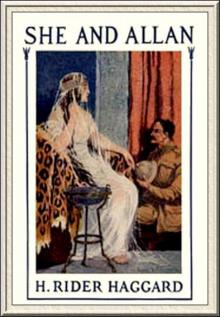 She and Allan
She and Allan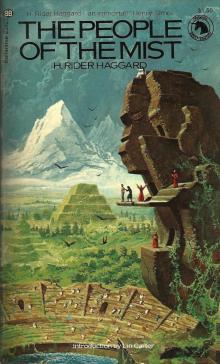 The People of the Mist
The People of the Mist She
She Morning Star
Morning Star King Solomon's Mines
King Solomon's Mines She: A History of Adventure
She: A History of Adventure Cleopatra
Cleopatra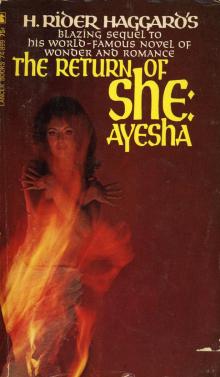 Ayesha, the Return of She
Ayesha, the Return of She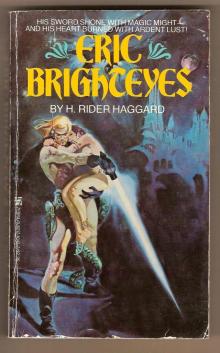 Eric Brighteyes
Eric Brighteyes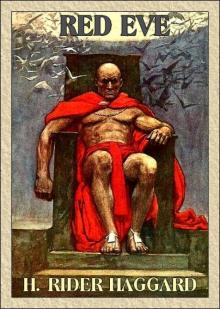 Red Eve
Red Eve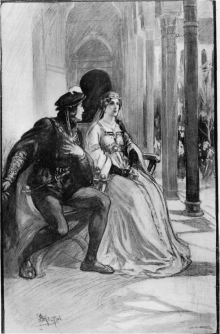 Fair Margaret
Fair Margaret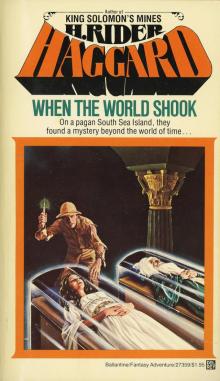 When the World Shook
When the World Shook Lysbeth, a Tale of the Dutch
Lysbeth, a Tale of the Dutch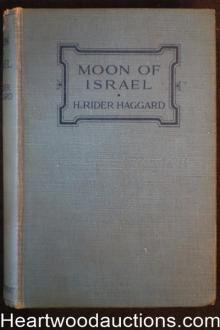 Moon of Israel: A Tale of the Exodus
Moon of Israel: A Tale of the Exodus Long Odds
Long Odds The Ghost Kings
The Ghost Kings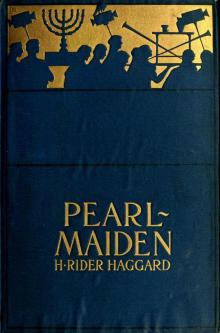 Pearl-Maiden: A Tale of the Fall of Jerusalem
Pearl-Maiden: A Tale of the Fall of Jerusalem Allan and the Holy Flower
Allan and the Holy Flower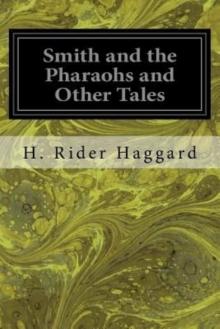 Smith and the Pharaohs, and other Tales
Smith and the Pharaohs, and other Tales The Wanderer's Necklace
The Wanderer's Necklace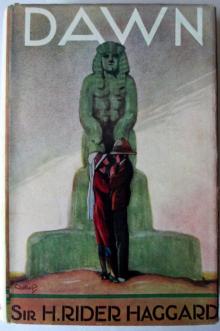 Dawn
Dawn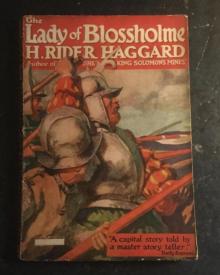 The Lady of Blossholme
The Lady of Blossholme Stella Fregelius: A Tale of Three Destinies
Stella Fregelius: A Tale of Three Destinies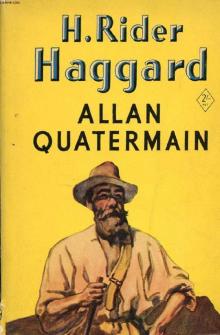 Allan Quatermain
Allan Quatermain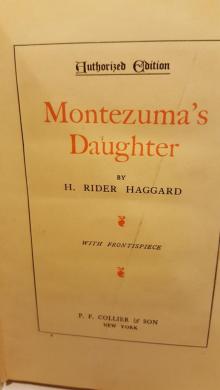 Montezuma's Daughter
Montezuma's Daughter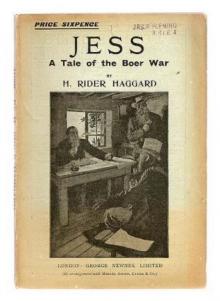 Jess
Jess The Brethren
The Brethren Allan's Wife
Allan's Wife Child of Storm
Child of Storm Queen Sheba's Ring
Queen Sheba's Ring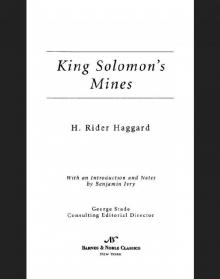 King Solomon's Mines (Barnes & Noble Classics Series)
King Solomon's Mines (Barnes & Noble Classics Series)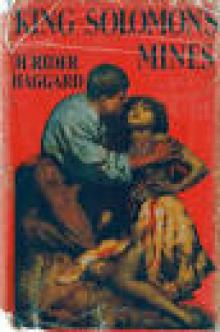 Complete Allan Quatermain Omnibus - Volumes 1 - 10
Complete Allan Quatermain Omnibus - Volumes 1 - 10